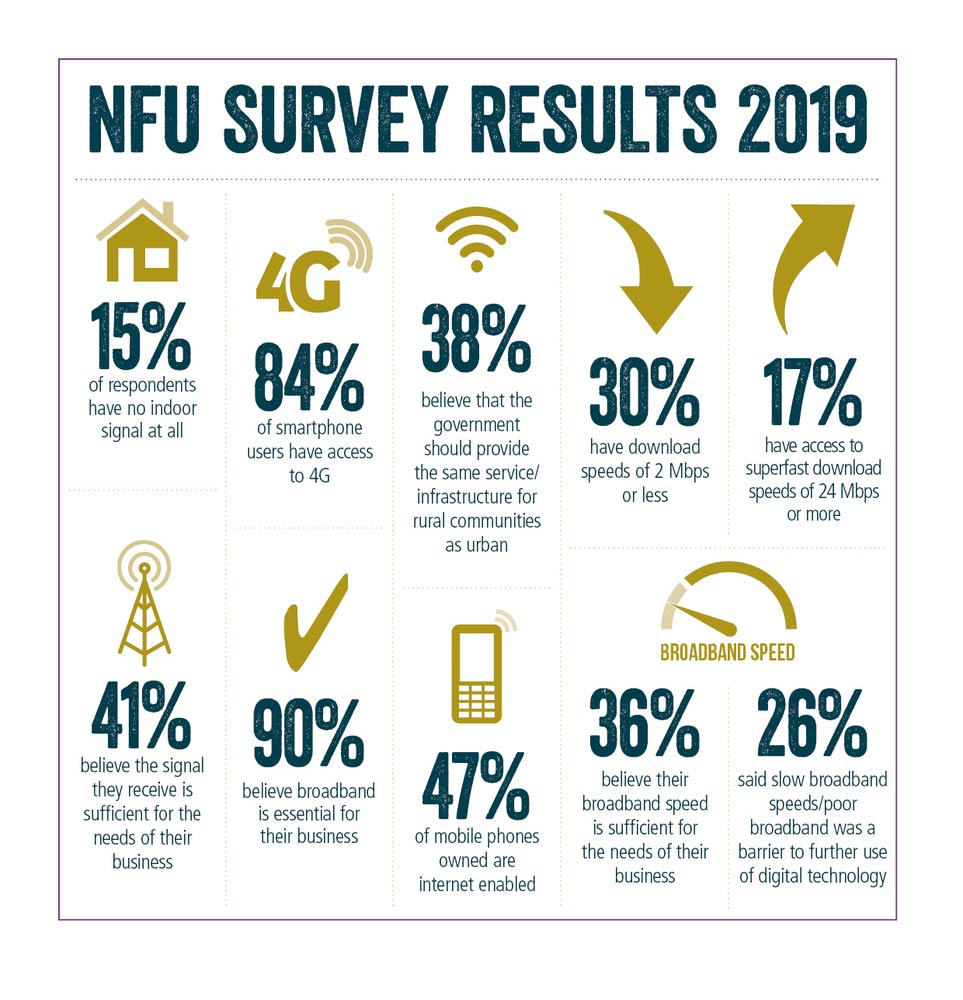More than 4 in 10 farmers still don’t have adequate broadband vital to conduct their business in the 21st century, according to the NFU's latest results from surveying members.
From increasing farm productivity through monitoring crops and livestock, to on farm diversification, the findings of the survey show it’s almost impossible to run a modern-day business without it, while a lack of mobile phone signal can impact on issues like isolation and mental health.
NFU Vice President Stuart Roberts said: “It really is completely unacceptable that in this high-tech digital age we appear to have a two-tier system of haves and have nots.
“British farming is first and foremost a business which relies on having fast and reliable access to the internet, yet as our new survey shows more than 4 in 10 of our members feel they still don’t have adequate access to broadband services needed to run a modern-day farming business.
“And it’s not just the farming business that’s impacted. A lack of mobile signal can have potentially serious consequences if you need to call for help in an emergency while working alone, and issues of mental wellbeing from feeling isolated can also be affected without having someone to talk to on the other end of a phone.
Snapshot: Progress by the NFU on mobile and broadband from 2015 to 2019
Since 2015, this annual survey has been an integral part of the NFU’s efforts to highlight the urgent need for improved rural digital services. While some areas of access have improved, there is still too large a gap between current levels of access and full coverage:
- In 2015 16% of respondents reported having no indoor signal. This has only minorly improved by 2019 with 15% reporting having no indoor signal.
- Outdoor locations with a reliable service have increased, but slowly. There has only been a 3% increase in total outdoor coverage since 2015, yet a 2% increase in respondents with no coverage at all.
- 70% of respondents with smartphones in 2015 had access to 4G, in comparison to 84% in 2019.
- In 2019, 36% of respondents felt that they had access to sufficient broadband speeds for their businesses an improvement on 23% in 2015 but still a significant minority.
- In 2015, 58% of respondents had download speeds of 2 Mbps or less, which has fallen to 30% in 2019.
- 4% of respondents had access to superfast download speeds in 2015. By 2019, this had risen to 17%.
In its 2019 Manifesto, the Conservative party pledged to improve infrastructure to benefit homes and businesses, saying:
"We intend to bring full fibre and gigabit-capable broadband to every home and business across the UK by 2025. We know how difficult it will be, so we have announced a raft of legislative changes to accelerate progress and £5 billion of new public funding to connect premises which are not commercially viable."
- Page 28, The Conservative and Unionist Party Manifesto 2019
“The current pace of broadband change and mobile connectivity in rural Britain is unacceptably too slow. The introduction of 5G and fibre broadband technology in cities means that, without action, the gap between urban and rural areas will continue to widen. That is why we are urging government and the telecommunications industry to make tackling the lack of rural connectivity a priority.
“We will continue to campaign for investment in the country’s digital infrastructure so farming businesses and the rural economy can continue to meet their huge potential not only as food producers but in helping to tackle climate change and deliver on our net zero ambitions.”

NFU members can download the full NFU broadband and digital member survey results here.
This document is accessible to NFU members only and you will be asked to log in.
How to log in: Use your membership number or the email address associated with your membership to log in. If you've forgotten your password, you can click here to reset it or contact NFU CallFirst on 0370 845 8458.
More from NFUonline:
